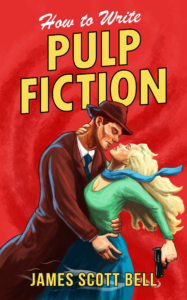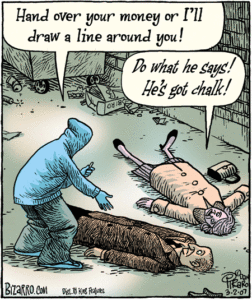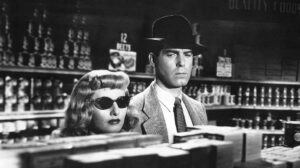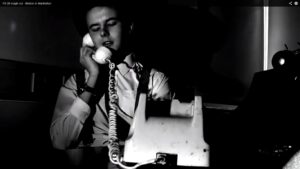TKZ wishes you warmth, blessings, and good times with family and friends. We now begin our annual break. See you right back here on January 6!
Monthly Archives: December 2019
What Path Should a Writer Take in 2020?
by James Scott Bell
@jamesscottbell
I’ve always used December as a month to re-calibrate and re-think my writing goals for the new year. Since we have writers at all stages of the journey here at TKZ, I thought it might be a good time to consider the various paths a writer might take…and how to choose among them.
- The Forbidden City
The traditional publishing industry—represented by the so-called “Big Five”—is still kicking it, though there are clear challenges ahead. This mega-model cannot sustain itself without developing new talent, but the risk capital for doing that is not so plentiful as it once was. What’s keeping the lights on in Manhattan offices is the ever-increasing dependence on A-list writers. Which means fewer resources to nurture midlist talent. As a recent article in Publishers Weekly put it:
[M]idlist sales have faltered enough in recent years that there is a growing concern among publishers and agents about how the business can create new hits when the field they once turned to is, well, disappearing…
A publisher at a major house agreed that, to an extent, publishers have contributed to the gap between the top sellers and those below. With social media offering a variety of ways to promote titles that are selling, publishers usually put more resources behind books that are succeeding in order to maintain momentum. As these books get the lion’s share of the houses’ focus, other titles are left to find audiences on their own.
The dependence on big hits by proven authors has also been exacerbated by two other developments, according to the article: “a shrinking physical retail market and an increase in competing entertainment driven by the proliferation of streaming TV platforms.”
Getting invited inside the walls of the Forbidden City has always been difficult. And it’s always been difficult to stay inside. With fewer slots available for new writers—and even less for a flat-selling mid-lister—the difficulty of this path has only increased.
- Small Publishing Companies
I’d define this slice of the publishing pie as any company not owned by the bigs but still operating in a traditional fashion. That is, they take on a manuscript and foot the bill for editing and design work. They may or may not pay an advance, but do offer traditional royalty terms.
I’d put Amazon Publishing (note: not Kindle Direct Publishing, which is for indie writers. See #3, below) at the top of this category, though it is truly unique in that it owns the largest (online) bookstore in the world, yet isn’t usually granted shelf space in brick-and-mortar stores (unless, of course, they own those stores!)
Also near the top is Kensington, which calls itself “America’s Independent Publisher.” (They must have good criteria as they publish this fellow.)
As presses get smaller, they usually have a tighter genre focus. For example, Graywolf tends toward the literary, while Brash Books walks the mean streets of crime. Powerhouse bestsellers from the smalls are as rare as the Blue-Footed Booby. But with the right partnership you may be able to put together a solid body of work and a steadily growing readership.
How do you find the right small publisher for your novel? You can still pick up a copy of Novel & Short Story Writer’s Market 2020 (which you ought to do soon, as the future of this publication is uncertain due to the sale of WD assets to Penguin Random House earlier this year).
Finally, there are “really small” companies springing up, seemingly all the time. They focus almost exclusively on ebooks. In many cases they’re run by indie writers who’ve had some success themselves, and seek to make extra scratch helping new writers get out to market.
A great big caveat scriptor is necessary here: it’s easy to call yourself a publisher, and just as easy to go bust. (I got a flaming email once from the founder of a one-person press after I issued a gentle warning to writers about such companies. How dare I! We can give more personal attention to individual writers! I wrote back and wished her good fortune. Eight months later the company was out of business, unable to pay their writers the royalties they were owed.)
While these micro publishers do not offer advances or require an agent, you really need to do your due diligence with any contract. (File this advice under “Duh.”)
How can you tell if a small press is legit? Start by reading this post.
- Indie (Self) Publishing
We’re twelve years into the ebook revolution, and enough time has gone by for the dust of the self-publishing “gold rush” (roughly 2008-2013) to settle back down to earth. We have adequate history now to assert a few things.
First, this path to market is still fast and without obstacle. Anyone can do it. That’s a blessing and a curse. A blessing because for the first time since Gutenberg it’s possible for an author to make bank outside the walls of the Forbidden City. A curse because there’s a great temptation to toss a book out there when it’s clearly not ready for prime time, and/or has a shoddy design.
There are innumerable books and blogs and courses that can teach you the technical details on getting your books online. If you are averse to being truly DIY (that is, dealing directly with Kindle, Nook, Kobo, etc.), there are aggregator sites that will do the distribution for you, in return for a percentage of your net proceeds. Your net is based on the retail price of your book, less the bookstore’s commission. For example, Amazon retains 30% as its commission when a book is sold off its site. The author gets 70%. The aggregator takes a slice (usually 15%) out of that 70% and sends you the balance. Smashwords and Draft2Digital are the leading aggregators right now. Here’s an article comparing the two. (Note: If a company charges you an upfront fee as opposed to percentage of net, it falls more into the category of a vanity press. See #4, below.)
Just remember that regardless of how you get your books to market, the three keys to making actual dough as an indie are 1) writing commercially viable books (i.e., in a popular genre); 2) being prolific; and 3) understanding that you’re running a small business.
That last item—business sense—gives many writers the willies. It’s hard enough to find the time to write! Now I have to spend time on business?
Well, yeah, if you truly want a shot at indie success. I wrote a book about the business principles you’ll need.
- Vanity Press
This is a business that makes money off authors, rather than the other way around. They require you to put up a pretty penny (do they make pretty pennies anymore?) to “publish” your book. They usually do a competent design job, but then what? They’ll offer to upsell you various packages (e.g., enhanced marketing) the value of which is negligible.
The article referenced earlier has a section on vanity presses. If you have written one book that you would like to distribute to family and friends in a nice hardcover edition—and have no desire to make writing a career…and you have lots of discretionary income—then perhaps a vanity publisher might be an option.
Whew. Now that we’ve covered these four paths open to writers today, we need to ask one more big question before making the choice, and that is: just what is it you want to accomplish, when all is said and done and published, with your writing? Here I think there are three possible answers.
The first is the amorphous concept of validation. A lot of writers I’ve talked to over the past ten years about self-publishing have given me variations on, “But I want the validation of a traditional contract.”
I call this notion “amorphous” because you can’t measure it. Will this type of validation give you 100% satisfaction? Probably not. How about 80%? Perhaps, but how long will that feeling last? If you become one of those writers who is dropped by a publisher (which will retain the rights to your output), what then? You’re five years into what you thought was a career and all that work you’ve done belongs to the company that let you go? And your dismal sales numbers make it impossible to land another contract with a like-sized company? (This makes it imperative that you and your agent negotiate a fair reversion clause, based on royalty income, and whatever else you can get.)
A more understandable reason for seeking a traditional contract (from a Big Five publisher) is to play the lottery. You’re hoping that one of your books will be among those chosen to get a huge marketing push, landing you a prime spot on the New York Times bestseller list and guaranteeing a long, seven-figures annually career. There are about two dozen authors who fit this profile and ten million who would like to. That’s why this is a lottery.
I find it a perfectly fine reason to knock on the doors of the Forbidden City. I just want you to be aware of the odds.
The third type of writer wants to create a reliable and steady stream of income. That could happen with the right small publisher partnership, but I find it more likely and lucrative in the indie world. My  favorite model is the classic pulp fiction era. The writers who made it were, above all, good storytellers. They knew their craft. They were also prolific and understood the market—just like successful indie writers today, of which there are many. I personally know several indies making healthy five- and six-figure annual incomes because they operate on pulp principles.
favorite model is the classic pulp fiction era. The writers who made it were, above all, good storytellers. They knew their craft. They were also prolific and understood the market—just like successful indie writers today, of which there are many. I personally know several indies making healthy five- and six-figure annual incomes because they operate on pulp principles.
Your assignment is clear. Figure out which motivation is most important to you. Then you can fashion 2020 plans and priorities accordingly. Next December, and each December after that, think through these considerations anew.
And whatever your choices—whatever type of writer you see yourself as—do this above all: Love the writing itself. Write with joy. Find and nurture your sweet spot. That’s the only thing that will sustain you over the long haul.
Which is why TKZ exists. We love writers and writing. We love sharing our insights, and hearing back from you in the comments. So as we wrap up another year, thank you for making this community one of the best places to hang out and talk about fiction craft and the book business. We now pause to catch our collective breath, and will see you back here on January 6, 2020!
Merry Christmas
Happy Hanukkah
Próspero año y felicidad!
READER FRIDAY: What Writing Craft Element is Most Important?

Of all the elements to the writing craft, which one is most important to you as a writer and/or a reader? Bonus points if you can give examples of novels that exemplify your answer.
Below is my attempt to list Craft Elements. Did I leave anything out?
Character
Setting
Plot
POV
Theme
Style/Voice
Dialogue
Action
Exposition
Conflict
Motivation
Climax
Resolution
Key Ways to Lure Readers with an Opening – First Page Critique: Follow the Raptor

Wikimedia Commons
My last TKZ first page critique for 2019. I want to thank all the brave authors who have submitted their novel introductions to share with our TKZ community. Although it’s never easy to hear criticism, no matter who you are, we grow as authors by taking risks. Kudos to all the courageous writers we have at TKZ–those who submit their work and those who offer constructive criticism. Thank you all.
***
From the airport, I drove north in a rental car toward Ketchum, and turned onto a small paved road that ended at an estate owned by a man who had offered to pay me handsomely for an assignment he wouldn’t describe over the phone. I announced myself to the intercom and the gates swung onto a flat curve of driveway. A big-guy checker piece in black answered the doorbell. He mumbled into an earpiece and jotted in a small notebook, a juxtaposition of the new and old. I noticed this because Tireia would notice, and lovers learn such habits from one another.
The big guy identified himself as Jonathan. He led me down a wide hall peopled by brass effigies and through double doors into the presence of a massive sandstone fireplace that loomed over curved and plush seating. The room was filled with paintings and statuary, rainforest plants, and stacks of oversized books on tables that looked as if they were laser-hewn from petrified wood. The drapes were open on floor-to-ceiling windows, displaying a lawn that flowed to sage-strewn foothills on this high-desert side of the road to Sun Valley.
Jonathan left and I wandered over to a Gainsborough-like portrait of a woman in a pleated gown that covered her feet. It was better than the other one on the same wall, of a high-breasted brunette in a print blouse, who sat in a thin chair and stared out of the 1940s at the viewer. She was familiar, and not being able to place her irritated me. The signature in the corner read, “Katherine March.”
Soft footsteps signaled the appearance of my trim and compact host. He sported a velvet smoking jacket and suede slippers, which made me grin.
“I’m Cassim Geyer,” he said.
“Reese Sapere.”
We shook hands.
“I assume you’ll be flying your plane home, Mr. Sapere, so I won’t offer liquor. Will tea do?”
“Tea? Yeah, OK.”
He went to the fireplace and pulled a bell cord, which delighted me only slightly less than the lovely young woman who soon appeared, in a short black skirt over a white blouse. Cassim requested the tea and sat down across from me. He flicked a bit of nothing from his slacks, looked up, and caught me regarding him.
“Tradition has its upside,” he said, “if you take it with a dollop of nonconformity.”
***
FEEDBACK
SETTING FOCUS IN INTRODUCTION – This introduction sticks with the action of what is happening. No real backstory. That’s a plus, but when the tedious description of the setting overtakes the narrative, the pace slows down to a crawl. The author hasn’t given me enough reason to care about the setting. I really don’t know where Ketchum is – in Oklahoma or Idaho? If the character had more of a colorful opinion, I might see the reason for the description-to showcase and give insight into the character.
A reader isn’t as much after the details of a setting, but more about atmosphere and mood.
Here is an example of a more effective intro that paints a picture of setting, but it also reflects on the character and a darker mystery.
EXCERPT
In Margaret Atwood’s The Handmaid’s Tale, Offred introduces her room with details that not only grab us but hint at something dark:
A chair, a table, a lamp. Above, on the white ceiling, a relief ornament in the shape of a wreath and in the centre of it a blank space, plastered over, like the place in a face where the eye has been taken out. There must have been a chandelier once. They’ve removed anything you could tie a rope to.
If the action in this submission were better matched with the setting details, the main character might be more integral to the setting with hints of emotion or something more at stake. As it reads now, the setting descriptions are just an inventory of room furnishings. Below is a good example of how the author uses plain setting descriptions to stir feelings of foreboding in the reader and give insight into the female lead.
EXCERPT
Lynda La Plante’s Above Suspicion turns a simple setting into something ominous when the character realizes someone has violated her home and been inside. Can’t we all relate to being shaken at the possibility of a home invasion? This short description, that incorporates the details of a setting, gives insight into the woman living alone and the emotion she must be feeling.
Reaching for the bedside lamp, she stopped and withdrew her hand. The photograph of her father had been turned out to face the room. She touched it every night before she went to sleep. It was always facing towards her, towards the bed, not away from it. … In the darkness, what had felt safe before now felt frightening: the way the dressing-table mirror reflected the street-light through the curtains and the sight of the wardrobe door left slightly ajar.
MYSTERY – There are elements of mystery to this intro. Below are four I noticed, but not all of them are presented well.
Good Mystery Elements
1.) The character is paid handsomely for an undisclosed assignment. Why? This is a good mystery to drop at the start. Make the reader wonder what this guy does for a living. Good guy or bad.
2.) Who is Katherine March and why is she familiar to him? This is a good mystery. It’s intriguing and it has the potential for foreshadowing something to come. I like it.
Not so Good…
3.) What gender is the central character (male of female)? I have to wait until nearly the end of the dialogue where he’s called Mr. Sapere. Even the first name of Reese can be female. It’s not good to keep a reader guessing about gender, but this can be an easy fix if the author would introduce gender earlier.
4.) Who is Tireia? From the line – “I noticed this because Tireia would notice, and lovers learn such habits from one another.” There’s no attempt at an explanation, but why bring it up? This reads like a series with characters the reader should know. This kind of mystery will have the reader scratching their head and wondering why. I would find another way to bring this up later, but it’s not necessary in this intro. It’s only confusing.
LOCATION – I mentioned this earlier, but the reference to Ketchum could be in Idaho or Oklahoma or anywhere. A simple tag line would clear this up. Or the author could make a choice to make the setting clear from the start and make it memorable in short order, as in the excerpt below.
EXCERPT
Gabriel García Márquez, opening One Hundred Years of Solitude, introduces his village like this:
Macondo was a village of twenty adobe houses, built on the bank of a river of clear water that ran along a bed of polished stones, which were white and enormous, like prehistoric eggs.
FIRST SENTENCE LENGTH – The first sentence is too long with too many unrelated details, that they get lost in the length. My instincts would be to make the character more colorful with a more memorable voice. Give him an opinion of his surroundings that reflect on him, as a protagonist. Make him more wary of who this new client is and why is the man so secretive about the assignment. The first sentence (below) is tedious, forgettable, and the last part of the mystery assignment almost gets lost at the tail end.
From the airport, I drove north in a rental car toward Ketchum, and turned onto a small paved road that ended at an estate owned by a man who had offered to pay me handsomely for an assignment he wouldn’t describe over the phone.
Also, in this submission, we learn at the very end of the 400 words (in the dialogue) that the protagonist is a pilot and must have rented a car from the airport. It’s seems odd that we have to wait until the end dialogue to discover that Sapere is a pilot. It’s a bit confusing that the new client knows more about Sapere than the reader does, after being in Sapere’s head.
MAKE DIALOGUE COUNT – For the first lines of dialogue, they are very anti-climactic and chit-chatty.
WHERE IS THE ANTICIPATION? – I would’ve liked to see the author have a build up of anticipation where the protagonist is curious about the man who wants to pay him handsomely yet couldn’t talk about the assignment over the phone. This is how you build on the mystery, when the protagonist is drawn in himself and searches for clues.
It’s obvious the man he came to see is someone he doesn’t know. I would think he would screen his jobs better. Wouldn’t he be more wary? Wouldn’t his mind be searching the grounds for hints of the assignment or who this man is?
SUMMARY – This author shows talent. There’s a good crime fiction start here, but this reads like a first draft. With some feedback and filling out of details to create more mystery and a sense of anticipation, this introduction could be more effective.
FOR DISCUSSION:
Please share your constructive criticism with this writer and with your TKZ family. We all have an opportunity to learn.
Zipper Rescues and the Importance of Communication
Fair warning: This week’s post has very little to do with the craft of writing. In fact, it’s sort of a one-off non sequitur. I wrote it because I told these stories to some friends the other night, and they said, “You really should write those.” Well, this was the only venue that came to mind, and really, it does have a strong message about the importance of effective communication. So, here we go . . .
When I was 13 years old, I had to inform my mother that I had contracted gonorrhea. But more on that later.
One lesson I learned through the fire and rescue service is the importance of detailed, explicit communication when dealing the the victims of mishaps. As a medical provider with an important job to do, I occasionally lost track of how easily patients could be distracted more by perception than reality.
By way of background, EMT school trained us not just in overall emergency medical care, but also for some very specific rescue techniques. For example, there is such a thing as a “zipper rescue”, which is prompted by a “zipper injury.” This is a condition that in my experience applies exclusively to males who are in a hurry. Consumption of alcohol is frequently a factor. You’ve got the picture, right? Whether you want to or not? (I see you squirming over there!)
As you can imagine, patients who are suffering from this particular malady are often distraught, and always pretty bloody. Our protocol for zipper rescues was pretty simple: You use a pair of scissor to cut the zipper out of the trousers to take the tension off of things, and then transport the patient to the ER, where doctors would take care of the more detailed work. Honestly, you’d be shocked to know how many times I had to employ this technique in the field. It helped to have a college in close proximity to the firehouse.
This brings me to my communication failure. In this case, the patient was younger than usual–say, 12 or 13–and as far as I could tell, he was stone cold sober. He’d just been rushing things a bit too much. I assured him (and his mom) that this was something I was trained to take care of, and that soon he’d be feeling better.
Then he saw the scissors.
He, uh, jumped to the wrong conclusion. So did Mom, actually, which I found a little startling. Yeah, I kind of dropped the ball on that one, and no amount of backpedaling and explanation could stem the panic. I put the scissors back in the aid box and we transported him as-is, trousers and all. When the medical director asked me why I had violated the protocol, I explained. I’m not sure I’ve ever seen a doctor laugh that hard.
Which brings me to my adolescent venereal disease. And again, it comes down to garbled communication.
If you’ve ever been a young teen boy–or if you’ve had them in your life–you know that certain . . . obsessions kick in as the hormones hit. Showers become longer and alone time becomes more important. Are you with me? Now remember, we’re talking about the early 1970s in a house where certain things were never discussed. Never. Those corners of life were giant voyages of discovery.
So, there I was in Mr. Binion’s English class when all the girls were herded out of the room and the school nurse came in with her film strip projector and a lecture on the perils of venereal disease–or, simply, VD. Why this presentation was made in English class rather than, say, PE or Shop class, is a secret known only to the administration.
I’m confident that we probably learned important stuff that day, but the one detail that nailed me to my chair was this: One of the primary symptoms of gonorrhea is . . . wait for it . . . a milky white discharge from you-know-where.
Well, shit. For the life of me, I couldn’t figure out how or where I got infected, but I was INFECTED! At the rate I was going, blindness and dementia couldn’t be more than a week or two away. Days, maybe. I needed a doctor, and I needed one, like, yesterday!
When I walked home from the bus that afternoon, Mom knew that something was wrong. I tried denying it for a while, but ultimately, the tears came, and with them, the devastating news of my disease.
And I saw the look. My mom’s eyes would flash when she was amused–almost literally–and that’s what I saw. She tried to keep her poker face, presumably to save me from humiliation, but I knew then that I had somehow miscalculated. Things weren’t as bad as they seemed. That night, my dad and I had the most awkward conversation of my life.
Happy Holidays, everyone! I’ll see you in the New Year.
Kids, Don’t Try This At Home:
Some Really Awful Opening Lines
By PJ Parrish
It is a dark and stormy night. Really. The wind is wailing against the window panes as I write this. No snow down here in Tallahassee, but we’re getting the rear end of the big winter storm that is pounding across the country.
I’d say this is as good a time as any to talk about some really really really bad opening paragraphs. Plus, the holidays are upon us and I have to go to fight the huns and visigoths at the mall soon, and don’t have a lot of time and energy to give you any good craft advice tonight. My brain is fried. I’ll bet yours is as well. So…
My last post of 2019 is devoted to one of my favorite writing contests — the Bulwer-Lytton Fiction Contest! It’s held every year by the English Department of San Jose State University. Entrants are invited “to compose the opening sentence to the worst of all possible novels.” The contest is named after the esteemed English novelist and playwright Edward George Bulwer-Lytton. Here’s the opening of his 1830 novel Paul Clifford:
It was a dark and stormy night; the rain fell in torrents, except at occasional intervals, when it was checked by a violent gust of wind which swept up the streets (for it is in London that our scene lies), rattling along the housetops, and fiercely agitating the scanty flame of the lamps that struggled against the darkness.
Man, it just doesn’t get any better than that. Although many writers, since 1982, have been inspired to try. The contest honors bad openings in all genres — click here to read them all. Here’s this year’s Grand Prize winner. I’m not sure what the genre is, but I think the world is coming to an end.
Space Fleet Commander Brad Brad sat in silence, surrounded by a slowly dissipating cloud of smoke, maintaining the same forlorn frown that had been fixed upon his face since he’d accidentally destroyed the phenomenon known as time, thirteen inches ago. — Maxwell Archer, Mt Pleasant, Ontario, Canada
And since I am sucker for a pun, here’s the Grand Panjandrum’s Special Award:
Emile Zola wandered the dank and soggy streets of a gloomy Parisian night, the injustice of the Dreyfus affair weighing on him like a thousand baguettes, dreaming of some massage or therapy to relieve the tension and pain in his aching shoulders and back, and then suddenly he thought of his Italian friends and their newly invented warm water bath with air jets and he rapturously exclaimed that oft misquoted declaration — “Jacuzzi!” — Robert R Moore, North Falmouth, MA
Geez, I wish I had written that. Here’s the winner in Romance:
The villa in Tuscany is abandoned now, and nature, in the form of invasive vegetation, is reclaiming the small vineyard where Rodolfo and Susannah made love each afternoon, beginning with the creeping Coccinia virginiana, followed by the woody Polemonium gloriosa, and ending, of course, with the drooping Glandularia vulgaris. — Bob Pellicone, Lincroft, NJ
Wasn’t this made into a chick-flick starring Diane Lane and that really hot Italian guy? But I’ve saved the best for last. Here are the winner and runners-up from the Crime/Detective category. I’ve also added some critiques after each because, as we all know, we can learn a lot from awful writing. Read on, crime dogs, and for the moment at least, feel a million times better about your own work in progress. I know I do.
 Realising that his symptoms indicated a virtually undetectable, fast acting neurotoxin, CIA coroner Quinn Abner frantically wrote up the details, lay on the floor and, as a professional courtesy, did his best to draw a chalk outline of himself.— Jeremy Das, Loughborough, England.
Realising that his symptoms indicated a virtually undetectable, fast acting neurotoxin, CIA coroner Quinn Abner frantically wrote up the details, lay on the floor and, as a professional courtesy, did his best to draw a chalk outline of himself.— Jeremy Das, Loughborough, England.
What’s wrong here? Well, we all know better than to start a novel out with a gerund phrase, right? Tsk, tsk…
 Olivia followed her breasts into my office where I was studying the dead flies on the window sill and dropped a large brown envelope on my desk, which rearranged the dust as it came to rest next to my right elbow, causing me to lose interest in the flies as I watched her walk away, watched carefully while wondering if the motion of her hips could bring a dead man back to life, which led to wondering what she could do to a man who was still alive. — Will Dennehy, Cambridge, MD
Olivia followed her breasts into my office where I was studying the dead flies on the window sill and dropped a large brown envelope on my desk, which rearranged the dust as it came to rest next to my right elbow, causing me to lose interest in the flies as I watched her walk away, watched carefully while wondering if the motion of her hips could bring a dead man back to life, which led to wondering what she could do to a man who was still alive. — Will Dennehy, Cambridge, MD
Oh no, no, no…not another dame walks into the pebbled-glass detective office! This is a cliche, of course. Don’t let this happen to you. (Fred MacMurray could have used that advice).
As he pounded on the door, Billy ‘Four-Toes’ Capalone, wondered, not for the first time, if he wouldn’t have been better off in the joint, or even taking a concrete nap, but instead, he straightened his tie and gripped his bible, determined not to blow his cover in the Jehovah’s Witness Protection Program. — Arlen Feldman, Colorado Springs, CO
How many times has James told us not to open with a character wondering? Egads…
 Eyes bleary from yet another night of fruitlessly staking out the Ritz Motel in West Hollywood’s seedier quarter, hoping to get some usable dirt on Mrs. Hennigan’s wayward hubby Bill, Niles Cranworth, P.I., pushed the start button, cranked the wheel over, and pointed his well-traveled Chrysler 300 southward on La Cienega Boulevard (“La Cienega,” he noted with irony, being Spanish for “the cienega”). — Andrew Lundberg, Los Angeles, CA
Eyes bleary from yet another night of fruitlessly staking out the Ritz Motel in West Hollywood’s seedier quarter, hoping to get some usable dirt on Mrs. Hennigan’s wayward hubby Bill, Niles Cranworth, P.I., pushed the start button, cranked the wheel over, and pointed his well-traveled Chrysler 300 southward on La Cienega Boulevard (“La Cienega,” he noted with irony, being Spanish for “the cienega”). — Andrew Lundberg, Los Angeles, CA
Well, at least we know where we are in this opening. But I think the writer’s research is showing.
Detective Wilhelm Schmidt’s raspy voice poured through the telephone receiver like a dump truck of gravel unburdening its load—much like the trucks that worked around the clock at Rohrer’s Quarry off of 1-81, transporting payloads of lime, sandstone, crushed rock, and gypsum—though with Detective Schmidt’s heavy German accent, excavation on its own would not suffice, and a second, albeit entirely different industry would need to be invoked to really paint a crystal clear picture of his voice. — Cody Hanna, Lancaster, PA
There’s nothing worse than a writer in love with the sound of his own metaphor.
Prisoner #4420991 selected two large snow cones for his pre-execution last meal, much to everyone’s surprise, but #4420991 knew that death by lethal injection would come as sweet relief when balanced against the snow cone headache he expected to have. — Greg Homer, Diamond Springs, CA
Don’t ya hate it when the bad guy doesn’t have a name?
“I remember the moon had a face like Hannibal Lecter and that the wind blowing through the trees reminded me of the music from Psycho,” stated Effie Laudermilk as she sat in the courtroom stand on trial for the murder (which she vehemently denied) of her boyfriend whose partially eaten body was found in his car at the bottom of a pond. –Randy Blanton, Murfreesboro, TN
You know, I sorta kinda like this one. Peace out to all our friends here at the Kill Zone. An end-of-the-year tip of the hat to all of you who comment on our posts. May all your book ideas be merry and bright, and all your pages not white. (ie blank). And a big shout-out to all our First Page Critique writers. Yoose guys rock. See you next year.
Just Breathe… You’ve Got This
By Sue Coletta
 Writers wear many hats… wife/husband, mother/father, sister/brother, friend, marketer, editor, (some add) publisher, (some add) cover designer, (some add) audiobook narrator, (some add) speaker, (some add) coach, housekeeper, bookkeeper, blogger, social media user/expert, tax preparer, holiday host, baker, cook, etc., etc., etc.
Writers wear many hats… wife/husband, mother/father, sister/brother, friend, marketer, editor, (some add) publisher, (some add) cover designer, (some add) audiobook narrator, (some add) speaker, (some add) coach, housekeeper, bookkeeper, blogger, social media user/expert, tax preparer, holiday host, baker, cook, etc., etc., etc.
Under the best of circumstances, it’s a lot to juggle. During the holiday season, forget about it. Feeling overwhelmed is the new normal, especially if you’re hosting a holiday event.
First, breathe. You’ve got this.
When chaos starts shaking the to-do list in my face, I close my eyes, lean back, and breathe… It’s amazing what a few deep breaths can do. There’s a running joke in my family that I’m so chill, I’m practically a corpse. It’s true! My blood pressure rarely, if ever, rises above 110/60, even under stressful conditions. And you know why? Because I take advantage of the most powerful and the most basic gift we have — the ability to breathe.
It may not sound like much of a superpower, but controlled breathing improves overall health. Controlled breaths can calm the brain, regulate blood pressure, improve memory, feed the emotional region of the brain, boost the immune system, and increase energy and metabolism levels.
The Brain’s Breathing Pacemaker
A 2016 study accidently discovered a neural circuit in the brainstem that plays a pivotal role in the breathing-brain control connection. This circuit is called “the brain’s breathing pacemaker,” because it can be adjusted by alternating breathing rhythm, which influences our emotional state. Slow, controlled breathing decreases activity in the circuit while fast, erratic breathing increases activity. Why this occurs is still largely unknown, but knowing this circuit exists is a huge step closer to figuring it out.
Breathing Decreases Pain
Specifically, diaphragmatic breathing exercises. Ever watch an infant sleep? Their little tummy expands on the inhale and depletes on the exhale. They’re breathing through their diaphragm. We’re born breathing this way. It’s only as we grow older that we start depending on our lungs to do all the work.
Singers and athletes take advantage of diaphragmatic breathing techniques. Why not writers? If you find yourself hunched over the keyboard for too long, take a few moments to lay flat and concentrate on inflating your belly as you inhale through your nostrils. Then exhale while pulling your belly button toward your core. It takes a little practice to master the technique. Once you do, you can diaphragmatically breathe in any position. The best part is, it works!
Count Breaths for Emotional Well-Being
In 2018, another scientific study found that the mere act of counting breaths influenced “neuronal oscillations throughout the brain” in regions related to emotion. When participants counted correctly, brain activity showed a more organized pattern in the regions related to emotion, memory, and awareness, verse participants who breathed normally (without counting).
Controlled Breathing Boosts Memory
The rhythm of our breathing generates electrical activity in the brain that affects how well we remember. Scientists linked inhaling to a greater recall of fearful faces, but only when the participants breathed through their nose. They were also able to remember certain objects in greater detail while inhaling. Thus, researchers believe nasal inhalation triggers more electrical activity in the amygdala (brain’s emotional center). Inhaling also seems key to greater activity in the hippocampus, “the seat of memory,” according to Forbes.
Relaxation Response
The “Relaxation Response” (RR) is a physiological and psychological state opposite to the fight-or-flight response. RR therapy includes meditation, yoga, and repetitive prayer, and has been practiced for thousands of years. These stress-reducing practices counteract the adverse clinical effect of stress in disorders like hypertension, anxiety, insomnia, and aging.
Yet, research on the underlying molecular mechanisms of why it works remained undetermined until a 2017 study unearthed a fascinating discovery. Both short-term and long-term practitioners of meditation, yoga, and repetitive prayer showed “enhanced expression of genes associated with energy metabolism, mitochondrial function…” and more efficient insulin secretion, which helps with blood sugar management. Relaxation Response also reduces the expression of genes linked to inflammatory responses and stress-related pathways. In simpler terms, controlled breathing helps boost the immune system and improve energy metabolism.
Creativity
This probably goes without saying, but I’m mentioning it anyway. Good brain health increases creativity. Creativity helps inspiration. And inspiration ups word counts.

With all the rushing around for the holidays, combined with writing deadlines — either self-imposed or contracted — please take the time to breathe. Your body and your muse will thank you later. 🙂
Happy Holidays, my beloved TKZers! May all your writer dreams come true in 2020.
Set Up a Command Post Inside Your Character’s Head
by James Scott Bell
@jamesscottbell
Here is another first page for critique. It brings up a major issue that applies to all writers, but especially those writing fantasy and speculative fiction.
See you on the other side.
The Guide
Sam woke up in the middle of a field with a headache and a fuzzy memory of cold, rushing water. A thin black cat sat on the lowest branch of a large dead tree a few feet away. The cat hopped down from its perch, and disappeared behind the large trunk of the tree with a flick of its tail, as if to say, “Follow me, human.” After several minutes of walking, it turned around and stared. In an instant, the cat was gone and in its place, a man. “Make thy purpose known, mortal.”
Startled, Sam asked “Who are you?”
The man spoke, “I am Andrian, Guider of souls. Who might ye be, and from where do ye hail?”
“My… my name is Sam. I come from Oregon.”
“What bringst thee to my realm, ‘Sam’ of ‘Oregon’?”
“I… saw… a cat. I guess it wanted me to follow?”
“Ah, Cailleach.”
Once again, he was gone. In his place, the black cat from only moments ago. Just as quickly as he disappeared, he returned to his human form.
“Don’t– do that… It makes my headache worse…”
“My apologies. Be ye hungry?” There was something in his voice this time that sounded like….hopefulness? Curiosity? It was hard to tell. Nevertheless, Sam obliged. The man turned around, “Follow me.”
The man turned and began walking away. It was only after they reached an impassable wall of stone and being asked a direct question that he spoke again.
“How are we going to get past this cliff?”
“Do not worry. It is simply a cloaking spell I cast on my land, so that I may be hidden from view and protected in case something happens again.” He walked into the stone, and disappeared.
Sam asked, “What do you mean, ‘Something happening again’?”
He replied, “It is of no importance. Come, I shall give thee a meal.”
They crossed the barrier and Sam’s ears were filled with the sound of rushing water. Once through, the sound immediately stopped. Many different types of rare, colorful birds in all different sizes and colors sat perched on various branches. Andrian reached out, and a large white bird landed on his arm. The bird spoke, “Master has brought home a visitor?”
“Aye.”
***
JSB: Introductory note: I have a feeling the title here is for the chapter, not the book. If it is for the chapter, it’s fine. If for the book, please read my post on titles, for you can do much better.
A few months ago I wrote about the most important question you can ask about a scene. It is, Would they really? Is this how the characters would really act and speak under the specific conditions of that scene?
This is the overarching criticism I have of today’s piece. The result is that the reader, rather than being pulled into a unique story world, is kept at arm’s length. We don’t experience the scene along with the main character; we watch from afar. And Sam’s lack of reaction, resistance, wonder, fear, trembling or anything beyond “startled” runs afoul of the would they really? test. We get the feeling the characters are game pieces on a plot board being moved by the author, not living, breathing people making the moves themselves.
I want real characters here because I like this set-up—waking up in an alternate world. Yes, it’s been done, many times before, in fantasy and even, in a way, in noir (guy wakes up with amnesia). But that doesn’t mean a writer can’t tackle it afresh and put his unique stamp on it. Also a situation isn’t a cliché for a new reader (I’m assuming YA audience here).
So go for it.
But let’s make the “it” better.
Sam woke up in the middle of a field with a headache and a fuzzy memory of cold, rushing water.
Instead of starting us off in Sam’s head, allowing us to vicariously experience this most mind blowing of circumstances, the line merely tells us what’s happening. We need to be feeling, along with Sam, his groping toward consciousness. The only way to do that is to climb inside Sam’s head and lock the exit. Within his cranium is where you must set up your entire command post for the duration of your novel.
Firmly ensconced therein, you can only look through his eyes and think his thoughts. Since he’s just waking up he wouldn’t know that he is “in the middle of a field.” He has to find that out. Start by giving us his first sensations of waking. What does he see? What does he smell? (Smell is especially promising here. Wet dirt? Grass? Dung? Give us something!)
Weave in his pounding head and the memory of cold, rushing water (I like that last bit, as it dangles a mystery).
A thin black cat sat on the lowest branch of a large dead tree a few feet away.
Don’t just toss this in! Give it to us in real time, with vivid description and strategic revelation. What do I mean by the latter? My strategy would be to start with the tree and end with the cat, like a slow pan in a movie.
Describe the tree. Don’t just tell us it’s dead. Give us the gnarls and knots, the sharp witch fingers of the empty branches.
And when he finally gets to the cat, don’t let it just sit there. Make it ready to pounce and, more important, have it staring right at Sam! That’ll send a nice chill up the ol’ spine. We need more description of this kind, grounding us firmly in the reality of this unreal world. Channel your inner Stephen King. (Read, for example, the first page of The Gunslinger and you’ll see what I mean.)
The cat hopped down from its perch, and disappeared behind the large trunk of the tree with a flick of its tail, as if to say, “Follow me, human.” After several minutes of walking, it turned around and stared. In an instant, the cat was gone and in its place, a man. “Make thy purpose known, mortal.”
Okay, I’m lost. If the cat disappeared behind the trunk, where does the “several minutes of walking” come from? It took me a couple of readings to figure out that Sam is following the cat. But you don’t have that in there! So it seems like the cat walks away, or around the tree (?) but is still near Sam. You need a beat of Sam following. This is a perfect place to stretch some tension and give us more description of the world.
And how does the cat get “gone”? Does it just vanish? (Later, you imply that the cat and “the man” are the same, just different forms. A more liquid transformation would be the better choice.)
Next, you have the appearance of the “man.” And that’s all you give us, save for the Monty Pythonesque speech pattern. What the heck does he look like? His clothes, his coloring, his adornments? We desperately need these.
BTW, don’t take the Monty Python reference as a dig. You obviously want this scene (and, I’m assuming, the novel) to have some humor. That’s fine, but the humor needs to come out of the “reality.” If you don’t make us believe what Sam is experiencing, the humor will fall flat.
The late Danny Simon (Neil’s older brother, who taught both Neil and Woody Allen how to write narrative comedy) talked about knowing your “bubble.” He meant your story world. He said, “You must know ‘the world’ — physical and every other way — that you’re going to write about. That will suggest possibilities. You must ‘see’ all the characters in the scene, all the physical stuff, too. Each action of the characters is going to cause a re-action among other characters or the environment.” (And if you’re going to write with humor, you would do well to study the only known copy of notes from Danny Simon’s famous comedy-writing class.)
Startled, Sam asked “Who are you?”
Startled? I should say so! But I don’t tell the reader. Show it! Does Sam scramble backward? Lose his breath? Think he’s going crazy? Can he even speak?
The man spoke, “I am Andrian, Guider of souls.
We don’t need The man spoke. That’s obvious. Give us an action beat or description. He raised his arms or His eyes burned.
“My… my name is Sam. I come from Oregon.”
“What bringst thee to my realm, ‘Sam’ of ‘Oregon’?”
Okay, the fun begins. I’d lose the internal quote marks, though. That will confuse your intended audience, and isn’t needed. If you want to imply hesitation, he could say something like “Sam of O-Re-Gone?”
“My apologies. Be ye hungry?” There was something in his voice this time that sounded like….hopefulness? Curiosity? It was hard to tell. Nevertheless, Sam obliged.
Obliged is a wrong word choice. Sam obliged implies action, but there is no action, nor even a call to action. He was simply asked a question. So have Sam answer or nod.
The man turned around, “Follow me.”
The man turned and began walking away.
That’s one turn too many. It would mean the man is walking away, only backwards. Remember, visualize every single beat through Sam’s eyes. Easy fix: just lose one of the turns.
It was only after they reached an impassable wall of stone
Whoa! That was fast. They get to a “wall of stone” in a nanosecond of fiction time. I mean, there is pace, and then there’s warp speed (which, you’ll recall from Star Trek, blurs everything).
Don’t skip what we need to see and experience. It won’t hurt your pace if, again, you’re stretching the tension. Stretch it! What is Sam feeling as he follows? In fact, why is he following in the first place? There’s no hesitation or doubt. Would he really (not have any)?
And man, we need to see this “wall of stone.” How would Sam describe it? What would he notice? How would it make him feel?
and being asked a direct question that he spoke again.
You make it clear in the next line that it is Sam speaking. It’s his voice. But that means you don’t need to tell us he’s about to speak again in the previous line. Let the action do the work. The words he spoke again are superfluous.
“How are we going to get past this cliff?”
I don’t know what I’m supposed to see. A wall is not a cliff. A cliff has no wall. Ack!
They crossed the barrier
What barrier? It’s gone. And you don’t cross a barrier anyway. You cross a chasm. You scale or go around a barrier.
Many different types of rare, colorful birds in all different sizes and colors sat perched on various branches.
Another great opportunity for description! Let us see these birds as Sam does! Reds and yellows and oranges and purples! And unless Sam is an ornithologist he’s not seeing “rare.” He’s seeing other-worldly. How would Sam react to that?
Whew. Okay, I’ve been tough on you, writer, because you have a situation that would make me want to turn the page…IF I was fully invested in Sam and IF I could SEE this world. So please do this for me: climb inside Sam’s head and don’t come out until you’ve done a complete re-write of this opening scene. And I mean complete. Forget what you’ve written and start with a blank page. Go step-by-vivid-step. Take your time.
Weave us a dream!
Comments are welcome.
Gonna Find Out Who’s Naughty or Nice…
Photo by Karina Thomson from unsplash.com
The Christmas song “Santa Claus Is Comin’ To Town” is weighing on my mind right now, and the reason isn’t just the season. It is also because of the verse in the song which lightheartedly notes that Santa is making a list and checking it a couple of times for the purpose of finding out who is naughty or nice. Santa isn’t the only one who is doing that. Just about anyone — including you, and you, and you — can do it, too.
I had the occasion recently to get a look at an evidence list prepared by a local police department with regard to a homicide. I’ am not referring to the murder which occurred on my street last year. The one which I am discussing here took place in a neighboring suburb and involves a woman who has been charged with murdering her husband, who was a prominent physician in the area. The police in the course of their investigation subpoenaed, among other things, recordings made by the couple’s Echo devices; their ring cam and trail cam video recordings; and the ring cam video recordings of the house across the street from them. You may not know that your Echo and Apple devices aren’t listening only when you say, “Alexa, order me a pizza from Donatos” or “Siri, what is traffic like?” No, they are listening to everything you say, recording it, and storing it offsite in the cloud. Yes, I know, we have been assured that such recordings are erased after a certain amount of time. They aren’t, and police departments are increasingly utilizing these recordings in investigations. I don’t know about you, but I wouldn’t want to be sitting in a defendant’s Timberlands in court when an Alexa device plays back a recording of the accused telling someone, “I’m gonna kill that (insert your own term of endearment)!” This is thanks to technology in general and to devices in particular which may be sitting in your home.
Photo by Nvdu from unsplash.com
Did I mention police departments? Many or perhaps all of you have heard of ALPRs, or Automatic License Plate Readers. ALPRs take many forms. If you are fortunate enough to traverse a toll road on a regular basis you are probably aware that these devices are set up at the booths to scan your license plate. Should you blow through the gate without paying the piper your license plate number is duly recorded and read, the better so that the turnpike authority can send you an extremely expensive ticket. Similar units that do much more are now installed in police cars. They scan the license plates of parked and driven cars as the officer drives down the street. If the scanner detects a plate registered to someone who (to name one example) has a driver’s license which is suspended said someone’s information pops up on the unit’s screen, as does the license plate, the make and model of the car, and all sorts of other information. ALPRs were primarily used only by larger metropolitan police forces until recently. The cost of the hardware and software, however, has been reduced to the point that the price is within reach of most departments. Oh, a variation of it is available to you as well. Something that I call “ALPR lite” can behad bay anyone. It won’t give you the name, address, and vitals of everyone who drives by your house but it will record the license plate of any vehicle driving by the scanner hardware and the time of day it does it. It will also collate it. Anyone owning the hardware and possessing a subscription to the service can note how frequently a car bearing a certain plate number is driving past their house and the times that the visits occur. If there are frequent break-ins to homes or vehicles during times that coincide with the appearance of the vehicles or if the same vehicles pop up during porch pirating incidents this information can be given to the police for follow-up investigation. ALPRs are primarily being purchased and used by neighborhood associations and apartment complexes, but the price is under one hundred dollars per month and dropping. I would guess that within a couple of years — or maybe a few months — anyone who wants the service will be able to get it for less per month than for what they are spending on their overpriced coffee fix.
I mention this for a couple of reasons. From a professional standpoint, I am not seeing any of this technology being mentioned in mystery or domestic thriller fiction. That doesn’t mean that authors aren’t doing it, but I read enough of a cross-section of books in those genres that I would expect to be encountering it. I can, without hardly trying, think of a few different ways that a writer stuck on a plot could build a whodunit using an ALPR or Echo-type device as a foundation.
One last thing. Everything that makes you YOU is being analyzed, collated, considered, and shared as you do your holiday shopping and spending. The folks who issue those store loyalty cards that you scan at the checkout compile your purchasing data and sell it. Do you use credit cards or have installment loans? The information as to how you pay your debt each month is strained, drained, blued, tattooed and passed on. If you would like to see how your financial practices are sliced and diced, take a few minutes and check out this article, which discusses the minutia contained in your credit report and why you may or may not have difficulty the next time you go a financial institution looking for a loan. It’s fascinating information and it might provide an initial bit of grist for that financial thriller you’ve been thinking about writing.
Photo by Edrece Stansberry from unsplash.com
I’m not trying to frighten you. I’m attempting to forewarn you by turning on a light to reveal a corner of the world that you may not be aware of. It isn’t just Santa who knows all about you when you are sleeping and what you are doing when you are awake. Be forewarned. And with that knowledge, please have a Merry Christmas and a Happy New Year. We’ll see you in 2020 if the creek doesn’t rise.
Photo by Metin Ozer from unsplash.com
READER FRIDAY: Tell Us About the Novel You’re Most Proud of

When someone asks me to recommend one of my books, I never know what to say. Beauty is in the eye of the beholder and all my children are beautiful in different ways. My stock answer (in my head) is – my next one, because I’m always striving for a challenge and trying something different.
But if you had to pick…
Tell us about a novel you wrote that you’re most proud of and why.












